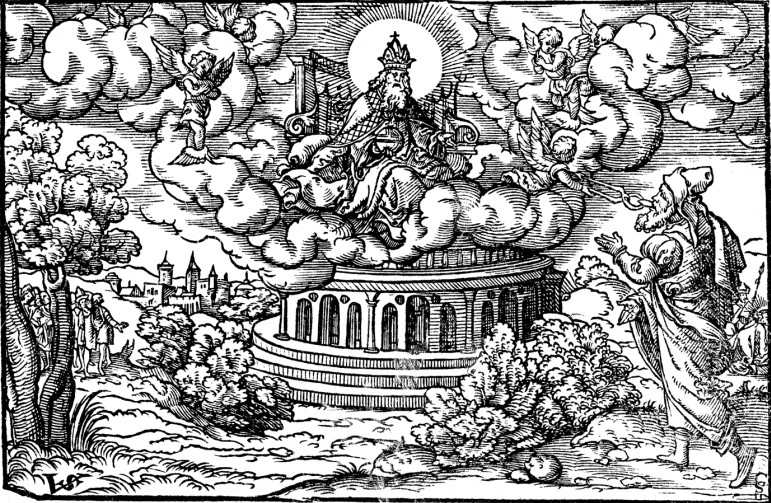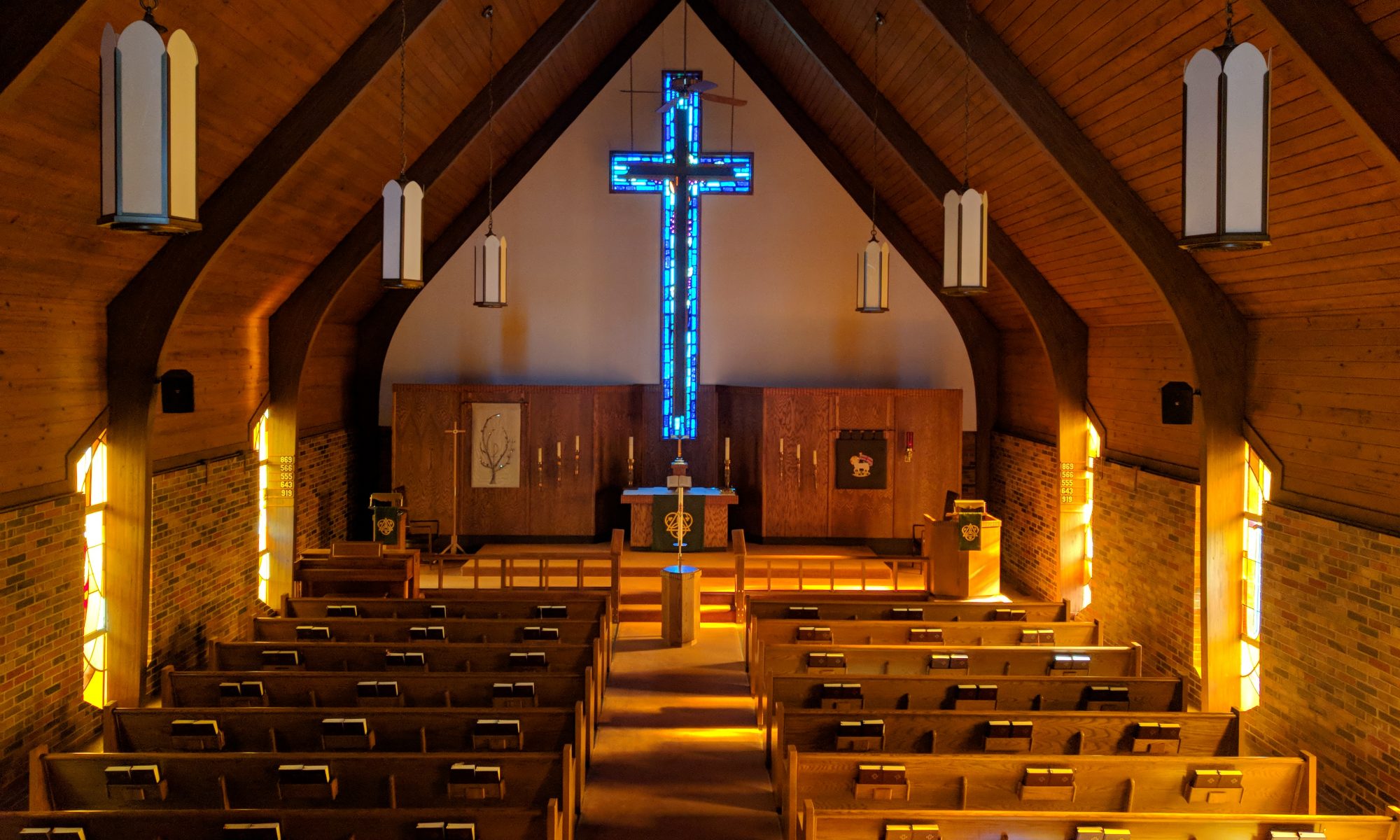
Lessons: Isaiah 6:1-7, Romans 11:33-36, John 3:1-17
Hymns: LSB 504, 953, 621, 940, 505
Grace, mercy, and peace to you from God our Father and our Lord and Savior, Jesus Christ. Amen.
Today is the Feast of the Holy Trinity. It’s the Sunday everyone remembers as the day we confess the rather-long Athanasian Creed, which articulates the Scripture’s teaching on the mystery of the Holy Trinity. It’s interesting that the observance of this Sunday as the Feast of the Holy Trinity is a relative newcomer in the Church Year, even though our Triune God exists from eternity, with God the Son begotten of the Father from all eternity and God the Holy Spirit proceeding from the Father and the Son in eternity. Until the 14th century in the Western Church, this day was known as the Octave of Pentecost—the eighth day of Pentecost. While this day changed from the Octave of Pentecost to the Feast of the Holy Trinity, the Gospel reading remains the same. As Jesus teaches, we must be born of water and the Spirit to be saved. And Jesus refers to the three persons of the Holy Trinity when He said to Nicodemus, “Amen, Amen, I say to you, We speak of what We know, and bear witness to what We have seen, but you do not receive Our testimony” (John 3:11).
Nicodemus was confused by what Jesus was saying. He didn’t understand what it meant to be born again, which many still have troubles understanding. I remember learning a song when I was a child that said, “Bullfrogs and butterflies. We’ve both been born again.” The point when I learned the song is that some of God’s creatures go through a new birth and we must also be born again to be Christian. Unfortunately, many Christians are not taught that this new birth by the water and the Spirit is Holy Baptism. Instead, they are taught that being born again is a spiritual makeover by which the Holy Spirit enables Christians to accept Jesus into their hearts and to conform their will to God’s will. Many will pinpoint the date when they gave themselves to the Lord as the day they were born again.
Jesus makes it much simpler. God the Holy Spirit works as He wills. God adds sinners to His family, declaring them saints through the Sacrament of Holy Baptism. Through Baptism, we are born again. In Baptism, we are united to the death of Jesus, and we die to sin. Also in Baptism, we are united to the resurrection of Jesus, and we are raised to newness of life (Rom. 6:1-11). God does the action; we are recipients. God is the One who works our conversion; we do not contribute to our salvation. After all, before we were even born, God loved us and sent His only begotten Son to die for us. He paid for our sins before we could even ask Him. He even promised to Adam and Eve that His Son will earn their salvation, even while they wanted to hide from God and make excuses for why they ate the forbidden fruit. Unlike most Christian churches, as Lutherans we believe in divine monergism—the teaching that God does the entire work of our salvation and conversion, even the work of us being born again.
Why is there so much disagreement over what it means to be born again within Christendom? Why are there so many who reject infant Baptism and the clear teachings of Scripture concerning new birth and Holy Baptism? What we believe, teach, and confess concerning these doctrines is very much in Christendom’s minority. Does this make us wrong? Are we now behooved to accept what the majority teaches?
We are not. As you heard from Dr. Deterding last week, we will abide by what God teaches in Holy Scripture. The Spirit of God guides us through His Word as recorded in the Bible. During the time of Elijah, the prophets of Baal outnumbered the prophets of God, yet God’s Word remained the truth. On Good Friday, the crowd majority was busy shouting to Pilate, “Crucify Him, Crucify Him!” And in the 300s, there appeared to be fewer true Christians than those who followed Arius—a man who rejected the Bible’s teaching on the personhood of Christ, claiming Jesus was a creation of God the Father. Majorities do not establish truth. Instead, God’s Word establishes truth.
Many think that the Christian Church must change her teachings to remain relevant to the modern world. Many think the Christian Church must go along with the cultural trends and societal beliefs that continually change like reeds blowing in the wind. They may figure they are doing God and His people a service, but they are not. For God does not need new teachings, nor does He change to go along with them. God does not need our help our counsel to figure out how to win souls for Christ in our day. God already knows.
In our Epistle, St. Paul asks a great question as he quotes Isaiah 40:13. Our Epistle is very fitting on this day as we humbly submit to God’s teaching concerning the Holy Trinity, confessing, “Oh, the depth of the riches and wisdom and knowledge of God! How unsearchable are his judgments and how inscrutable his ways.” Then Paul asks, “For who has known the mind of the Lord, or who has been His counselor?” (Rom. 11:33-36). That is, who among us can teach God? What do we have to offer Him that He doesn’t already know or understand?
Jesus describes the Holy Spirit as the Paraclete. That word can be understood as our Helper, Comforter, or Counselor. He’s the One who helps us as He converts our hearts of stone to hearts of living faith. He comforts us with the Gospel by directing our hearts and minds to Jesus. He counsels us through His Word. This teaching that the Holy Spirit is our Counselor is expressed in today’s 3rd Communion hymn.
Godly counsel is a blessed thing. We should gladly receive it. The Scriptures were, after all, “written for our learning, that we through the patience and comfort of the Scriptures might have hope” (Rom. 15:4). It is also written, “All Scripture is given by inspiration of God, and is profitable for doctrine, for reproof, for correction, for instruction in righteousness, that the man of God may be complete, thoroughly equipped for every good work” (2 Tim. 3:16-17). Martin Luther describes the Word of God as our counselor when he said, “[The Word] is greater than a hundred thousand worlds, yea, greater than heaven and earth. That Word shall be my faithful counselor and sturdy tree to which I will cling in order that I may bear and stand it. If we do not cling to that tree, our nature is much too weak to bear the burning hatred and envy of the world and to withstand the crafty plots and fiery darts of the devil.” (St. L. XIII:2621. as quoted from Pieper 1:118).
Godly counsel comes to us through God’s Word, through faithful ministers of God’s Word, and through faithful Christians. Again, we should gladly and readily receive such godly counsel. Often, we do not want it, especially if we are being counseled to amend our ways or our beliefs. That hurts our Old Adam, and we often find it easier to pander to our sinful nature’s desires or go along with societal trends.
And we must resist ungodly counsel, despite how well-meaning it may seem. I recall an occasion as a seminary student when an older man who is not Lutheran and is a member of the Masonic Lodge offered me some counsel (remember as Lutherans we do not agree with the religious elements and vows made by secret societies and lodges). He basically tried to convince me that it doesn’t matter what people believe, because he figured all sincere people are going to Heaven. He wanted to show me—and very politely I might add—that our beliefs in the Missouri Synod are too restrictive and should be changed. Now, his approach toward me was excellent. His words (when not matched with Scripture) seemed wise. He was certainly sincere. Many of the marks of offering good counsel.
But I would not have it. Why? Is it because I’m too stubborn? Do I disrespect my elders? Do I just love to argue? No, none of those. Instead, he is not God’s counselor, nor am I. What God teaches me in His Word is the truth that I must adhere to. I cannot accept any counsel that contradicts the teachings of Scripture. Luther said it well when he was put on trial, being told to recant his writings at the Diet of Worms on April 18, 1521, saying, “Unless I am convinced by the testimony of the Scriptures or by clear reason, I am bound by the Scriptures I have quoted and my conscience is captive to the Word of God. I cannot and I will not retract anything, since it is neither safe nor right to go against conscience. I cannot do otherwise, here I stand, may God help me.”
You see, no one can be God’s counselor, for we did not create God; instead, God created us. God teaches us. He shows us what is truly pleasing in His sight. He teaches us what to reject. He teaches what is true morality. He teaches salvation is granted by His grace alone. Even though many will try to counsel God, even claiming God has changed His teachings on many matters, God remains immutable (that is, He cannot change). And many will offer us ungodly counsel as Satan tries to turn us away from the truths of Scripture, including the mystery of the Holy Trinity. But we will remain steadfast to God’s Word. We will confess Him as He reveals Himself, even if we cannot fully understand the Trinity. We will receive with meekness the implanted Word which saves our souls (James 1:21). And we will rejoice in His truth.
For Jesus says, “If you abide in My word, you are My disciples indeed. And you shall know the truth, and the truth shall set you free” (John 8:31-32). When our sins are forgiven by grace through faith, we are set free. We are no longer bound to our sins, our pasts, or even the pollution we’ve received from others through their sinful actions against us. We are no longer bound to Satan’s chains or lies. We are no longer bound to the shifting sands of society’s opinions. We are no longer bound to death. For as Christ lives, so shall we. We are truly children of God, born again by water and the Spirit, baptized in the name of the Father and of the Son and of the Holy Spirit, redeemed by Christ who died for us on the cross, and heirs of eternal life. Amen.
The peace of God which passes all understanding keep your hearts and minds in Christ Jesus to life everlasting. Amen

